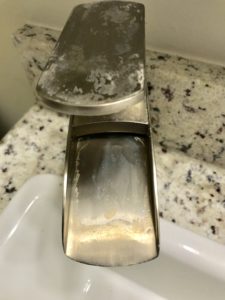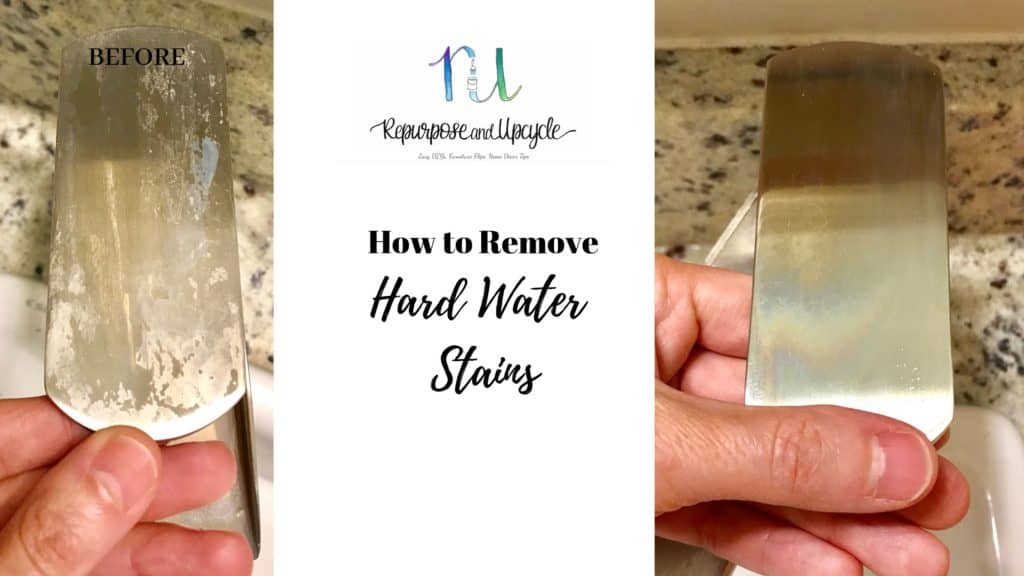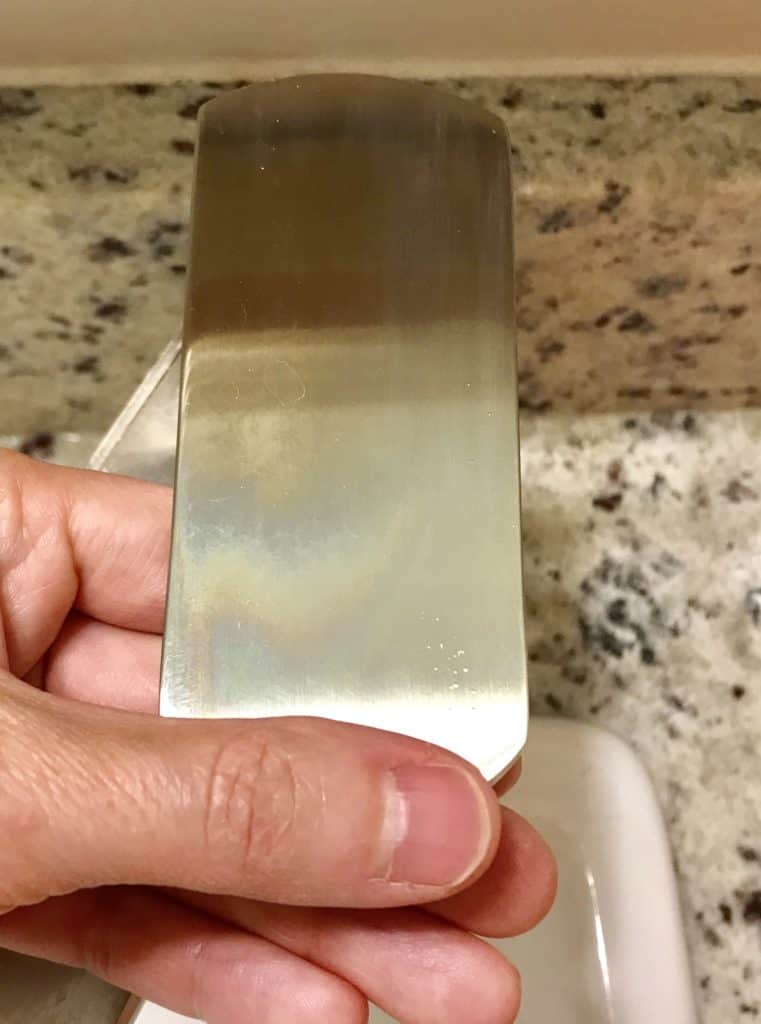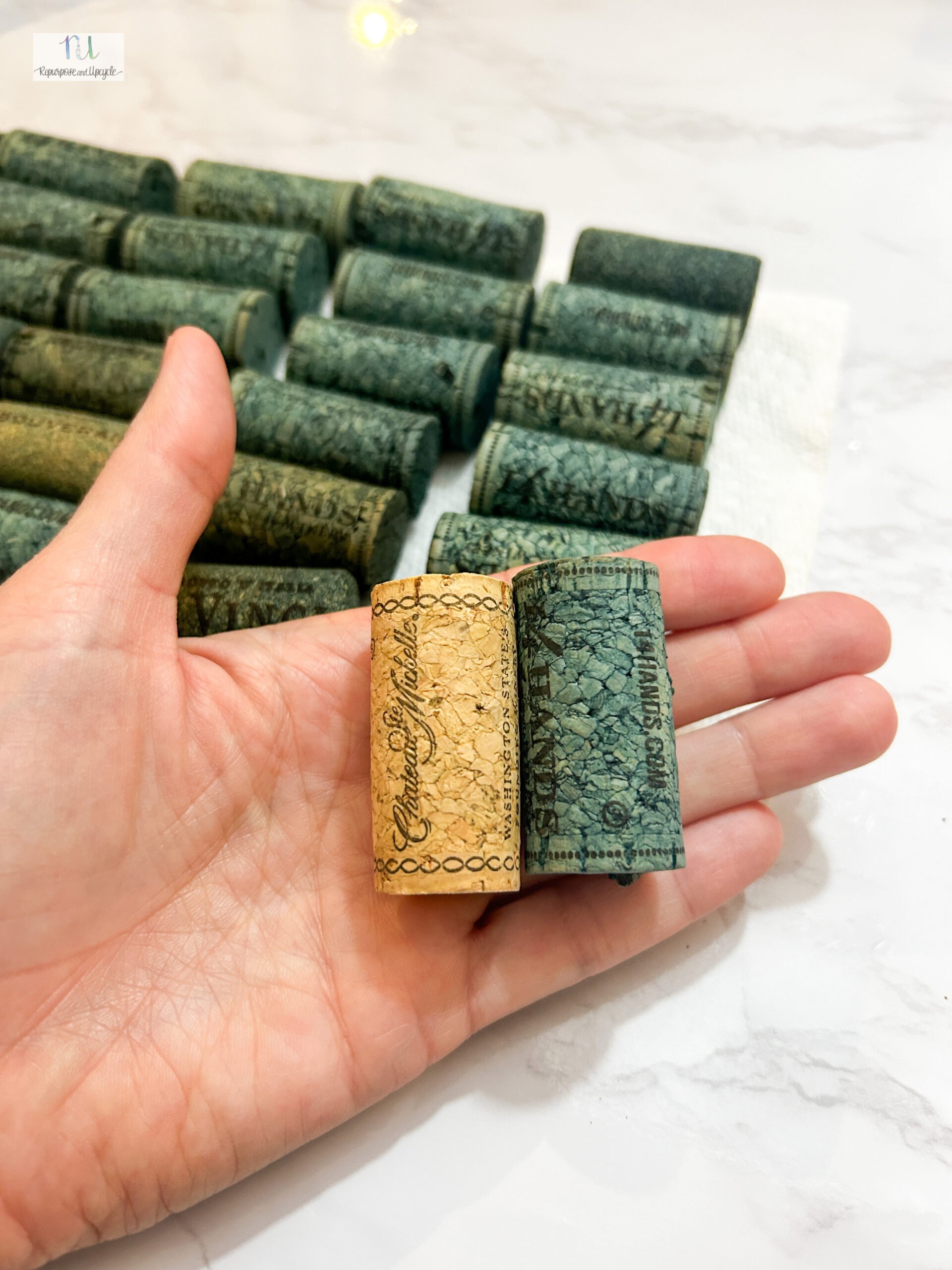Are you annoyed with those white spots on your kitchen and bathroom faucets? You know, the buildup of “gunk” that remains after water has evaporated on the surface. Our current faucets hold A LOT of water, therefore making A LOT of stubborn stains. I finally decided to get the bottom of these tough stains! It took a few trial and errors, but I’ve figured out the trick and I’ll share it with you. A little hint; it requires more than using just a cup of vinegar because vinegar alone won’t remove our hard water stains.
Want to know something sad…..the pictures below are AFTER I thoroughly cleaned the faucets. Yep these are clean hard water stains. YUCK!


The bad part is we feel like we needed to apologize when we have friends over and they use our bathrooms.
“I’m sorry about the faucets, they really are clean, it’s just hard water stains.”
Yep, kind of embarrassing.
Enough of the water build up problem, let’s get to the solution.
I started like most people probably do when they have a problem, searching the web.
Ninety percent of websites said to use vinegar to remove hard water build up.
Well I tried vinegar.
I soaked a paper towel in vinegar and let it sit on the faucet for one hour. It did help bring some of the calcium deposits or hard water spots to the surface, but it did not remove them.
I thought about mixing a little bleach with the vinegar, or just using bleach to remove the unwanted gunk. I was worried that the bleach would remove the chrome finish from my faucets, and then we would have another problem.
Also, I was informed by a reader that the combination of vinegar and bleach can cause toxic fumes! Don’t mix those two!
Disclosure; this post contains affiliate links. As an Amazon Associate I earn from qualifying purchases. This disclosure statement refers to the rest of the Amazon links in this post.
Then I read how some folks use vinegar and baking soda to remove hard water stains! This seemed to be the best way to try to remove the mineral content or hard water deposits off the surface.
Here’s the deal with baking soda and vinegar. When you pour vinegar over baking soda it fizzes like a volcano! Imagine what that “fizz” can do to remove hard water or calcium buildup.
Understanding Hard Water Stains
Hard water stains occur when minerals, such as calcium and magnesium, build up on surfaces over time. This happens because you have “hard water;” which means you have a heavy buildup of these minerals in your water supply. Can you use a water softener to help this problem? Probably, but you just don’t hear of folks doing that.
So what do you do with those minerals in hard water that can leave behind unsightly stains on everything from glass surfaces (like those glass shower doors) to kitchen sinks? Even a shower head needs some good deep cleaning to remove the build up.
There are a few key things to understand about hard water stains. First, it’s important to know that hard water isn’t harmful to your health. However, it can be a nuisance when it comes to cleaning. Second, hard water stains can be difficult to remove if they’re not addressed promptly. The longer the stains are left to sit, the harder they become to remove.
There are a few common signs that you may have hard water stains in your home. These include:
- White or cloudy spots on glassware
- Streaks or spots on shower doors or bathroom fixtures
- Discoloration or staining on sinks or toilets
- A buildup of soap scum in the shower or bathtub
If you notice any of these signs, it’s likely that you have hard water stains in your home. The good news is that there are a few simple steps you can take to remove these stains and prevent them from coming back.
Removing Hard Water Stains with Vinegar Alone
One of the most effective and affordable ways to remove hard water stains is by using vinegar. Vinegar is a mild acid that can dissolve mineral deposits and stains, making it an excellent natural cleaning agent. Not every hard water stain will require using more than just vinegar.
As a matter of fact, it’s always a good idea to test using vinegar first before you add the baking soda. I’m sure there are chemical cleaners that work well to remove hard water stains, but this “paste” is one of a few natural remedies to remove the stains without commercial cleaners. Here’s a simple cleaning hack on how to remove hard water stains with vinegar:
- Gather Supplies: You will need white vinegar, a spray bottle, a clean cloth or sponge, and water.
- Dilute Vinegar: Mix equal parts vinegar to water and put it in a spray bottle. Shake well to combine.
- Spray the Affected Area: Spray the vinegar solution onto the hard water stains and let it sit for a few minutes. The vinegar will dissolve the mineral deposits and stains.
- Scrub the Area: Use a clean damp cloth or sponge to scrub the area gently. For tougher stains, you can use a soft-bristled brush or old toothbrush. Be careful not to scratch the surface.
- Rinse with Water: Rinse the area thoroughly with water to remove any remaining vinegar solution and loosened mineral deposits.
- Dry the Area: Use a clean, dry soft cloth to dry the area.
It’s important to note that vinegar is acidic and can damage some surfaces, such as natural stone, marble, and granite countertops. Before using vinegar on any surface, test it on a small area first.
What happens when you mix vinegar and baking soda?
Pouring vinegar over baking soda causes an acid based reaction that cuts through stubborn hard water stains. This is why this baking soda paste can be a good hard water stain removal for a pesky stained area.
How to Remove Hard Water Stains with vinegar and baking soda
- Mix two tablespoons of vinegar with one tablespoon of baking soda
- Rub the surface with the solution
- Pour a little baking soda on the surface
- Add a few tablespoons of your solution on top of the baking soda to make a “paste”
- Let it sit at least 15 minutes
- Use a plastic tool to lightly scrub certain areas if needed
- Wipe it clean and be amazed!
I’m going to try this method in my shower. Hard water buildup can be terrible in places like showers too!
You won’t believe the difference!

I’m so pleased with how my faucets look now that the grime and build up are mostly gone. I’m sure there are a few different methods for removing hard water issues, but this one works for me!
I know it won’t last forever, but at least I know how to get rid of it.

Did you enjoy this post? Feel free to share it to Pinterest.

Thanks for stopping by guys! If you have any other hard water tips let me know in the comments! I’m always up for learning new cleaning hacks.
Lindsey**





